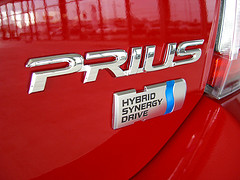 Toyota already has several successful independent brands – the Prius at a lower price for younger buyers and the Lexus at a higher price for older, luxury car buyers. Now, Toyota is considering making the hybrid Prius an independent brand complete with new models. A smaller Prius and larger Prius are both being considered for the new brand lineup.
Toyota already has several successful independent brands – the Prius at a lower price for younger buyers and the Lexus at a higher price for older, luxury car buyers. Now, Toyota is considering making the hybrid Prius an independent brand complete with new models. A smaller Prius and larger Prius are both being considered for the new brand lineup.
According to James E. Lentz III, president of Toyota Motor Sales USA, the Prius independent brand strategy comes directly from consumer demand and market conditions. In short, consumers want more fuel efficient car choices in the United States, and the Prius is the most popular hybrid car in the U.S. It makes sense to extend the line and make Prius its own brand.
Unlike Lexus vehicles that are sold in separate dealerships from other Toyota brands, the Prius would likely sit in the same dealerships as Toyota and Scion branded vehicles. Again, this makes sense since it will be easier to try to move customers from one brand to another within the same dealership (e.g., switch from Toyota to Prius, move up from Scion to Toyota or Prius, etc.). According to the New York Times blog, Green Inc, Toyota is already working on developing a Prius logo.
While other car manufacturers struggle to keep up with Toyota, the market leader is listening to consumers, looking ahead to predict future market conditions, and modifying its overall branding strategy to meet those demands. It’s a perfect example of trying to be proactive rather than reactionary. Think of it this way, Chevrolet doesn’t expect the Chevy Volt (its version of a hybrid) to be available in the United States until late 2010 or 2011. Toyota and Prius will be on to bigger and better things by then.
What can we learn from this? Don’t try to create a product or brand then force feed it to consumers. Instead, listen to consumer demand, be knowledgeable of market conditions, look into the future and embrace the changes it brings, then develop products and brands that proactively leverage those learnings. It’s an obvious lesson but one that corporations (who are famous for getting in their own way) can forget. Be the Toyota of your market.
Image: Flickr
Susan Gunelius is the author of 10 marketing, social media, branding, copywriting, and technology books, and she is President & CEO of KeySplash Creative, Inc., a marketing communications company. She also owns Women on Business, an award-wining blog for business women. She is a featured columnist for Entrepreneur.com and Forbes.com, and her marketing-related articles have appeared on websites such as MSNBC.com, BusinessWeek.com, TodayShow.com, and more.
She has over 20 years of experience in the marketing field having spent the first decade of her career directing marketing programs for some of the largest companies in the world, including divisions of AT&T and HSBC. Today, her clients include large and small companies around the world and household brands like Citigroup, Cox Communications, Intuit, and more. Susan is frequently interviewed about marketing and branding by television, radio, print, and online media organizations, and she speaks about these topics at events around the world. You can connect with her on Twitter, Facebook, LinkedIn, or Google+.



I agree with these conclusions about driving brand based on customer need but I’m not sure it’s wise to create a new parent brand out of Prius. In the case of Lexus, Toyota developed a separate brand because customers didn’t believe that Toyota could believably support a luxury brand. If Prius is marketed with less connection to Toyota, they will lose or bring into question the selling points of the Toyota brand’s core assets of reliability and durability. Addtionally, aren’t all of us consumers going to have to move to high-mileage alternative-fuel vehicles over time? If so, won’t this brand detract from the appeal of all other Toyota cars? Intel ran into this problem with their Intel Inside ingredient brand. It worked really well for their computer chip products, but left their other offerings out in the cold.
I do believe that this will only make Toyota look worse. They do not need to separate the two and create a new independent brand. They need to build on the Toyota name so that people think they are very versatile. Toyota is a very good company when it comes to vehicles so why not try to dominate in every section.
The Intel example is an excellent one and a great point. Might Toyota ultimately make its core brand obsolete? It’s an interesting discussion!